What it Takes: Youth Working for Peace and Equality
60 Days of Learning, From Youth Through Peace to Gender
It was a startling discovery five years ago that prompted then 21-year-old Shubey Nantege of Uganda to found Go Girl Africa. The organization has provided financial literacy skills to 2,500 girls and young women, helping them make positive changes in their lives. Leaders like Shubey illustrate how young people are essential partners in promoting peacebuilding and gender equality, a point worth highlighting today on International Youth Day. The occasion also provides an opportunity to spotlight gaps in international assistance that can be filled to strengthen the role of young people in advancing peace and equality.

USIP will use the next 60 days—from International Youth Day through the International Day of Peace on Sept. 21 and on to the International Day of the Girl Child on Oct. 11, to highlight how youth leadership, peacebuilding and the push for gender equality intersect. This year is particularly special. For the first time, the United Nations Security Council last December adopted Resolution 2250 on Youth, Peace and Security to recognize the potential of youth leadership. That resolution recognizes the critical role of youth in promoting and maintaining peace and calls for the international community to emphasize young people as critical partners for peace.
“The potential to engage youth is enormous … and the need is huge.”
Shubey’s inspiration came from a chance encounter with a young cousin who had been sent away in disgrace when she became pregnant at age 15. Shubey thought the girl was living in a village and being cared for. Instead, here she was, roaming a city street—as a sex worker. When Shubey asked her cousin why she turned to prostitution, the girl replied simply that she had no choice. She had had her child and needed to survive.
The shocking circumstances left their mark on Shubey. The next year, 2012, she launched Go Girl Africa. The aim, she says, is “to help vulnerable girls create legitimate sources of income that do not place their health and lives at risk.” She now is a fellow in USIP’s Generation Change program, which trains young civic leaders in the Middle East, Africa and beyond with leadership skills and connects them to support each other in their difficult work.
Shubey is one of thousands of under-recognized youth around the world who are devoting their lives to building peace and promoting development. The U.S. government launched a program in 2010 to highlight the work of youth leaders, the Young African Leaders Initiative (YALI). In its first year, over 10,000 African leaders applied for 500 slots. The level of competition was extraordinary and indicative of incredible youth leadership globally.
Some of the leaders came to Washington, D.C. through YALI to meet President Obama and other senior officials from government and civil society. Their accomplishments and aspirations were amazing. The potential to engage youth is enormous, particularly to create more inclusive societies and to address the needs of young girls and women.
The Prospects of Girl and Country
The need is huge. Girls in conflict-affected countries are 90 percent more likely to be out of secondary school than their counterparts in areas not experiencing violent conflict, according to the U.N. Educational, Scientific and Cultural Organization (UNESCO). According to the World Bank, each year of secondary education for a girl correlates to a 25 percent increase in wages later in life, so even a slight investment in girls can have a substantial economic impact.
The connection to stability is clear. The best predictor of a state’s peacefulness is how well women are treated. According to the World Bank, the larger the gender gap in a country, the greater the likelihood of its involvement in civil or cross-border conflict.
Unfortunately, significant gaps in international assistance undermine the extent to which the world can benefit from youth leadership for both peace and equality. Youth includes both girls and boys, young women and young men. But youth-oriented peacebuilding policies and programs most often target young men. And peacebuilding programs that aim to enhance women’s participation often fail to include adolescent girls and young women. This leaves girls and young women excluded from peace and security efforts and leads to further marginalization. Girls and young women have the capacity to be strong partners for peace and security. They are already standing up to the Taliban in the fight for girls’ education and participating in collective action for democracy in the Arab Spring. So young women are shaping the course of peace and security.
During the next 60 days, USIP will highlight the critical work that young women and men are doing to increase gender equality in their communities, and we will exchange crucial skills and approaches for building more inclusive societies, while exploring the connections between youth, peace and gender.
Join our effort and learn more about youth, peace and gender at #YouthPeaceEquality.
Carla Koppell is USIP’s vice president for the Center for Applied Conflict Transformation. She previously served as chief strategy officer for the U.S. Agency for International Development. Alison Milofsky is director of curriculum and training design in USIP’s Academy.



